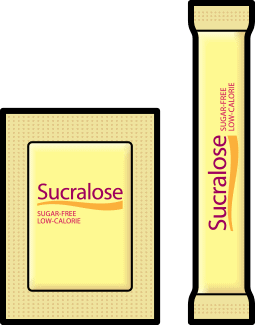Artificial sweeteners are laboratory engineered compounds that can imitate the sweet taste of natural sweeteners like sucrose(sugar). In the case of Sucralose, it's touted as being zero calorie and is noted as being 600 times sweeter than sugar(1).
Sucralose is a synthetic sweetener that is generally considered vegan-friendly since it does not contain any animal product or by-product. However, ethical vegans do not consider sucralose as vegan-friendly as its creation involved animal testing.
This article will discuss the chemical properties and the various applications of sucralose. It will also discuss whether sucralose is vegan, particularly if sucralose is free from animal and animal-derived ingredients and the reports of animal cruelty.
Table of Contents
What is Sucralose?

Sucralose is a synthetic sweetener derived from sugar through a multi-stage chemical process. It is the product of replacing three hydrogen-oxygen atoms in sugar with three chlorine atoms.
Unlike Sucrose, Sucralose is not used in energy production. Most consumed Sucralose is not absorbed and the small amount that is, none of it is broken down for energy use; It is also excreted quickly in the urine(2).
Food and beverages that that are made with Sucralose are often recommended for people who are diabetic. Extensive research has shown that Sucralose does not raise blood sugar levels or affect blood glucose control in humans(3, 4, 5).
Granted, some studies do exist(6) that raise questions about Glucose control. However, randomized clinical trials(7, 8) do not support these hypotheses.
Sucralose is used as a replacement for sucrose (sugar). It’s stable in a wide range of pH and temperature ranges. It can also be combined with regular sugars like fructose and sucrose to reduce the calorie and carbohydrate content of a product without compromising the taste.
It can serve as a taste enhancer for alcoholic and fermented products since it can neutralize their acidity. It is also used as an ingredient in personal care products like mouth wash, toothpaste, and chewable tablets since it can mask their bitter tastes.
Is Sucralose Vegan?
Free from Animal or Animal-Derived Ingredients?
A vegan diet is completely plant-based. Vegans consume products that are free from animal or animal-derived ingredients.
Most people consider sucralose vegan since it is made entirely from sugar. Moreover, powdered sucralose is commonly combined with other plant-based ingredients such as corn-derived dextrose and maltodextrin that serve as its bulking agents (Splenda).
It's important to note that Splenda is not processed using animal products:
"Most Splenda Brand products are made without animal or animal by-products – there are three exceptions, including: Splenda Coffee Creamers, Splenda Brown Sugar Blend, and Splenda Diabetes Care Shakes."
Splenda®
There are several ways to synthesize sucralose, however the following manufacturing process is the most common: esterification, chlorination, and deacetylation. JK Sucralose Inc.'s patent details this information here: https://patents.google.com/
Liquid sucralose is also combined with vegan-friendly preservatives such as sodium benzoate and potassium sorbate and with acidulants such as citric acid and succinic acid.
All of these processes are done using reacting agents that are purely derived from non-animal sources. Sucralose is also filtered with coal-derived ingredients instead of animal bone char that is commonly usually used for filtering sweeteners like sugar.
Is Sucralose Free from Animal Cruelty?
Some vegans also exclude products that are associated with animal cruelty. They are against the unethical use of animals in testing the efficacy of products for human consumption. This is due to their belief that animals are not commodities and should not be subjected to any form of unnecessary suffering.
Ethical vegans do not consider sucralose to be vegan-friendly as it was reported to be tested on animals. The researchers estimated that 12,800 animals died during research.
It was reported that researchers fed sucralose-infused food to several dogs, rabbits, mice, and monkeys. Most of the animal test subjects died from gut inflammation, intestinal disorders, and brain damage.
*Sources for this information are no longer online but can be found via Wayback Machine's Digital Archive:
Is Sucralose Health-Friendly?
The FDA has certified that sucralose is safe for human consumption despite its chlorine content. The chlorine does not separate from sucralose even when ingested. Moreover, it does not accumulate in the body and is quickly expelled through the urine.
Sucralose is generally safe as long as it is used in moderation. However, some vegans prefer to use natural vegan-friendly sweeteners like pure maple syrup, coconut sugar, and molasses.
Sucralose is not absorbed in the body. However, it may damage the gut microbiome and decrease the beneficial gut bacteria since it is metabolized in the digestive tract.
More specifically, a study on rats found that the consumption of sucralose decreased the total anaerobes and aerobic bacteria, bifidobacteria, lactobacilli, Bacteroides, and Clostridium(9). With that said, the Gut Microbiome profile from person to person can be entirely different. Research is still needed in this area.
A study also found that it may be linked to the development of metabolic syndrome(10); a blanket term for high blood pressure, high blood sugar, and high cholesterol levels.
Some vegans also question the heat-resistant properties of sucralose and claim that sucralose is not safe for cooking and baking. It can breakdown at very high temperatures(11) and interact with other ingredients. Sucralose can produce carcinogenic substances when mixed with certain ingredients. For instance, it produces a carcinogenic compound called chloropropanols when mixed with glycerol compounds from fat.
Some vegans also claim that sucralose can raise insulin and blood sugar levels especially for people who are not accustomed to artificial sweeteners. These theories(12) claim that sucralose triggers sweet taste receptors in the mouth and causes cephalic phase insulin release.
Final Thoughts
For most Vegans, Sucralose meets the definition of being Vegan as it's free from any animal or animal-derived ingredient. However, from an ethical standpoint, sucralose is not considered vegan as it was developed at the expense of animals.
References:
2. https://pubmed.ncbi.nlm.nih.gov/
5. https://pubmed.ncbi.nlm.nih.gov/
6. https://www.ncbi.nlm.nih.gov/
7. https://pubmed.ncbi.nlm.nih.gov/
8. https://pubmed.ncbi.nlm.nih.gov/
9. https://www.ncbi.nlm.nih.gov/
10. https://www.eurekalert.org/




